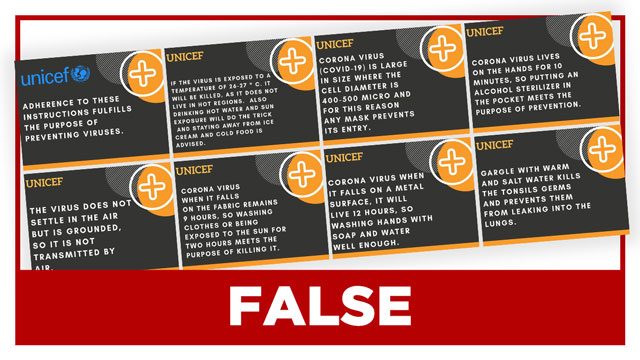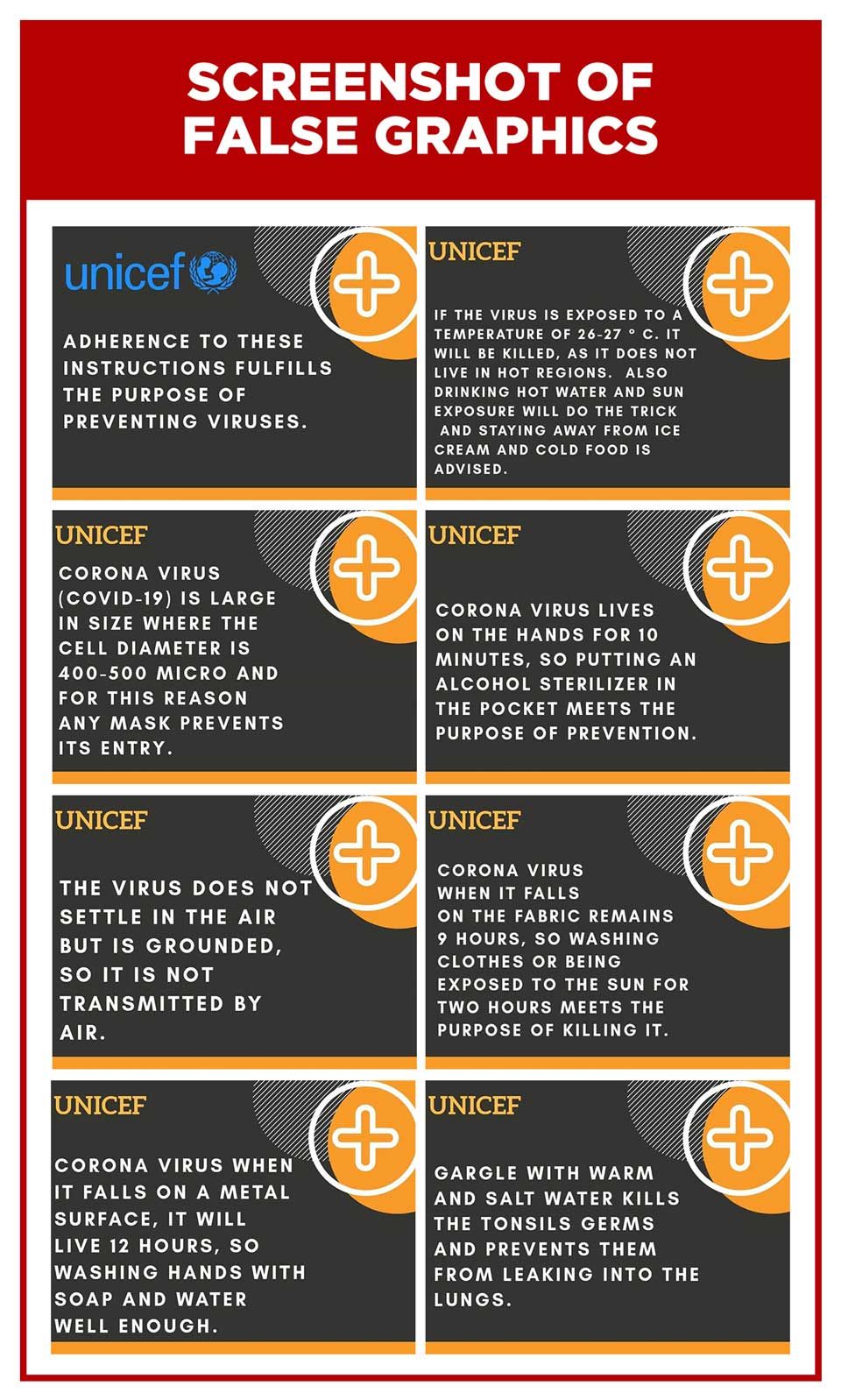SUMMARY
This is AI generated summarization, which may have errors. For context, always refer to the full article.

Claim: Graphics or social media cards supposedly from the international body United Nations Children’s Fund (Unicef) contain tips and information on how to prevent and combat the coronavirus outbreak and the disease it causes, COVID-19.
A set of 8 graphics with the logo and name of Unicef on it was shared online and through chats in early March. The text on these graphics had also been posted as Facebook statuses, citing Unicef as source.
“Adherence to these instructions fulfills the purpose of preventing viruses,” said one of the graphics in these posts.
According to the “tips,” the virus “will be killed” when it is “exposed” to high temperatures, the cell diameter of the virus is “large” so “any mask prevents its entry,” and that “staying away from ice cream and cold food is advised.”
Many Facebook pages and accounts have shared these graphics as of posting, according to Facebook’s Claim Check dashboard. A reader also emailed a link to these posts to Rappler for verification.

Rating: FALSE
The facts: The graphics and the tips are not from Unicef.
Charlotte Petri Gornitzka, Unicef deputy executive director for partnerships, said in a statement on March 6 that these posts and online messages misappropriated the UN body’s name.
“A recent erroneous online message circulating in several languages around the world and purporting to be a Unicef communication appears to indicate, among other things, that avoiding ice cream and other cold foods can help prevent the onset of the disease. This is, of course, wholly untrue,” said Petri Gornitzka.
“To the creators of such falsehoods, we offer a simple message: Stop. Sharing inaccurate information and attempting to imbue it with authority by misappropriating the names of those in a position of trust is dangerous and wrong,” she added.
In addition, Unicef Philippines said in a Facebook post on March 8 that the graphics did not come from the UN body. “Unicef does not issue coronavirus advisories on chat apps. The ones circulating now are not from Unicef,” it said.
In various bulletins, health authorities regularly advise the public to wash or sanitize hands frequently, practice proper etiquette when coughing or sneezing, avoid touching the face, maintain distance from persons with flu-like symptoms, and avoid crowded spaces.
As for some of the claims in the “tips,” Rappler found the following information from health authorities and various studies:
- Rappler reported in earlier fact checks that temperature does not affect the spread of COVID-19. The World Health Organization (WHO) has said they do not recommend exposure to heat as protection or treatment for the virus. It has also said that the coronavirus “has spread to countries with both hot and humid climates, as well as cold and dry.”
- Studies so far show that COVID-19 can spread through respiratory droplets produced when an infected person coughs or sneezes. These droplets can also land on objects or surfaces around the person. “This is why it is important to stay more than 1 meter (3 feet) away from a person who is sick,” said the WHO.
- The US Centers for Disease Control and Prevention (CDC) explained that surgical masks are loose-fitting and thus “[do] not provide the wearer with a reliable level of protection from inhaling smaller airborne particles.” Meanwhile, N95 masks are tight-fitting and requires fit-testing on the wearer’s face. The WHO advised that those coughing or sneezing or those taking care of sick or infected persons should wear face masks.
- The Department of Health (DOH) said in late January that there is no evidence so far that gargling with a salt-water solution will kill the virus.
Both Petri Gornitzka and Unicef Philippines encouraged the public to get accurate information only from official government agencies, intergovernmental public health bodies, and verified sources. (LIST: Where to get official, reliable info on novel coronavirus)
“To members of the public, we ask that you seek accurate information about how to keep yourself and your family safe from verified sources, such as Unicef or WHO, government health officials and trusted healthcare professionals; and that you refrain from sharing information from untrustworthy or unverified sources,” said Petri Gornitzka.
Unicef Philippines added, “We post updates and safety tips on official verified Unicef accounts and on our official website.” It also linked to an article on Unicef’s official website with information on COVID-19 and tips for parents to protect their children.
“Always be mindful and check first with official Unicef, WHO and DOH channels before sharing posts,” added Unicef Philippines. – Michael Bueza/Rappler.com
Keep us aware of suspicious Facebook pages, groups, accounts, websites, articles, or photos in your network by contacting us at factcheck@rappler.com. Let us battle disinformation one Fact Check at a time.
More fact checks on COVID-19:
- FALSE: Vatican confirms Pope Francis ‘tested positive’ for coronavirus
- FALSE: ‘Official’ coronavirus face mask released
- FALSE: Cannabis ‘kills coronavirus’
- FALSE: ‘Photo’ of coronavirus-infected corpses in Wuhan
- FALSE: Video of Filipinos ‘eating bats in Wuhan, China’
- FALSE: Novel coronavirus ‘will not spread in PH’ due to high temperature, humidity
- FALSE: Natural ginger ale a ‘cure for coronavirus’
- FALSE: Media didn’t report novel coronavirus has low fatality rate
- FALSE: Novel coronavirus ‘can be cured by garlic’
- FALSE: Coronavirus can be ‘eliminated’ by high temperatures
- FALSE: Novel coronavirus a ‘type of rabies’
- FALSE: ‘Positive’ coronavirus case in Laguna hospital
- FALSE: ‘Patient tested positive’ for 2019-nCoV in Makati Medical Center
- FALSE: Chinese patient in Alabang clinic, hospital tested ‘positive’ for coronavirus
- FACT CHECK: Misinformation on novel coronavirus that spreads online
Add a comment
How does this make you feel?
There are no comments yet. Add your comment to start the conversation.